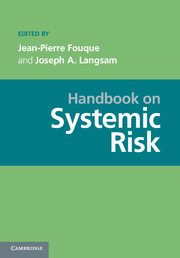Book contents
- Frontmatter
- Contents
- Contributors
- Introduction
- PART I DATA: THE PREREQUISITE FOR MANAGING SYSTEMIC RISK
- PART II STATISTICS AND SYSTEMIC RISK
- PART III MEASURING AND REGULATING SYSTEMIC RISK
- PART IV NETWORKS
- PART V SYSTEMIC RISK ANDMATHEMATICAL FINANCE
- PART VI COUNTERPARTY RISK AND SYSTEMIC RISK
- PART VII ALGORITHMIC TRADING
- PART VIII BEHAVIORAL FINANCE: THE PSYCHOLOGICAL DIMENSION OF SYSTEMIC RISK
- PART IX REGULATION
- 26 The New Financial Stability Framework in Europe
- 27 Sector-Level Financial Networks and Macroprudential Risk Analysis in the Euro Area
- 28 Systemic Risk EarlyWarning System: A Micro-Macro Prudential Synthesis
- PART X COMPUTATIONAL ISSUES AND REQUIREMENTS
- PART XI ACCOUNTING ISSUES
- References
26 - The New Financial Stability Framework in Europe
from PART IX - REGULATION
Published online by Cambridge University Press: 05 June 2013
- Frontmatter
- Contents
- Contributors
- Introduction
- PART I DATA: THE PREREQUISITE FOR MANAGING SYSTEMIC RISK
- PART II STATISTICS AND SYSTEMIC RISK
- PART III MEASURING AND REGULATING SYSTEMIC RISK
- PART IV NETWORKS
- PART V SYSTEMIC RISK ANDMATHEMATICAL FINANCE
- PART VI COUNTERPARTY RISK AND SYSTEMIC RISK
- PART VII ALGORITHMIC TRADING
- PART VIII BEHAVIORAL FINANCE: THE PSYCHOLOGICAL DIMENSION OF SYSTEMIC RISK
- PART IX REGULATION
- 26 The New Financial Stability Framework in Europe
- 27 Sector-Level Financial Networks and Macroprudential Risk Analysis in the Euro Area
- 28 Systemic Risk EarlyWarning System: A Micro-Macro Prudential Synthesis
- PART X COMPUTATIONAL ISSUES AND REQUIREMENTS
- PART XI ACCOUNTING ISSUES
- References
Summary
For it is your business, when the wall next door catches fire
Horace 65–8 BC, EpistlesAbstract The financial crisis has demonstrated the need to rethink the conceptual approach of risk and data collection within the financial sector, by taking a holistic, economic and financial system wide perspective. As part of maintaining financial stability in Europe, three European-wide supervisory authorities, a new supervisory task for credit institutions for the European Central Bank, and one macroprudential body have been established, which are supplemented by a scheme of inter-governmental financial assistance. This chapter provides an overview of the new challenges to manage systemic risks in the European financial system, focusing on the required macro- and micro level statistics and the new institutional and conceptual framework for identifying systemic risk and calls for further research to understand the behavioral aspects of decision making and herding effects in financial markets and to look beyond traditional economic theory, which seems to have failed to predict the size, magnitude and the contagion effects of the recent financial crises. Despite the fact that it is too early yet to judge the performance of the new financial stability framework, the set-up is in our view likely to have a major positive impact on the European endeavor to safeguard financial stability, bringing back the needed trust and confidence in financial markets.
Keywords Keywords: Financial stability, financial markets, financial statistics, banking union, systemic risk.
- Type
- Chapter
- Information
- Handbook on Systemic Risk , pp. 748 - 774Publisher: Cambridge University PressPrint publication year: 2013
References
- 3
- Cited by

